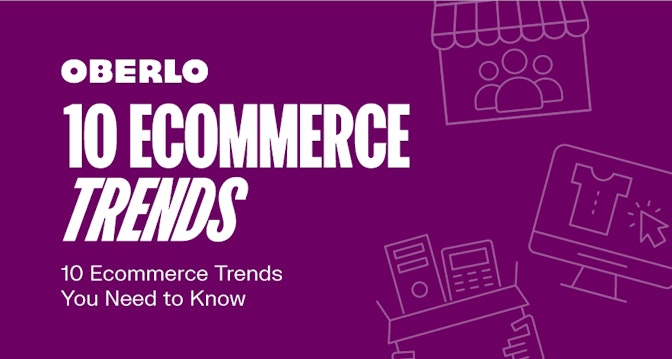All successful businesses are built on strong relationships.
The stronger the relationship, the deeper the level of trust, loyalty, and devotion customers will have for a brand. Think of Apple fans lining up in the cold to be the first to snag a new release of the iPhone.
But what happens if your customer relationships aren’t very strong?
Well, you’ll struggle to build your brand and retain customers. Plus, whenever competitors set out to poach customers from you, it’ll be like taking candy from a baby.
So if you aren’t proactively strengthening your customer relationships, you might be in big trouble, my friend.
In this article, you’ll learn all about how you can use relationship marketing to build your brand, dominate the market, and grow your bottom line.
Sound good?



What is Relationship Marketing?
Relationship marketing is a business strategy used to nurture long-term customer loyalty and engagement. The goal of relationship marketing is to develop strong bonds with your target market and customers through ongoing communications.
In other words, you want customers to genuinely like your brand.
→ Click Here to Launch Your Online Business with Shopify
Or as Jay Deutsch, CEO of merchandise agency BDA, puts it, “I view relationship marketing as a brand’s ability to create an emotional connection with the consumer.”
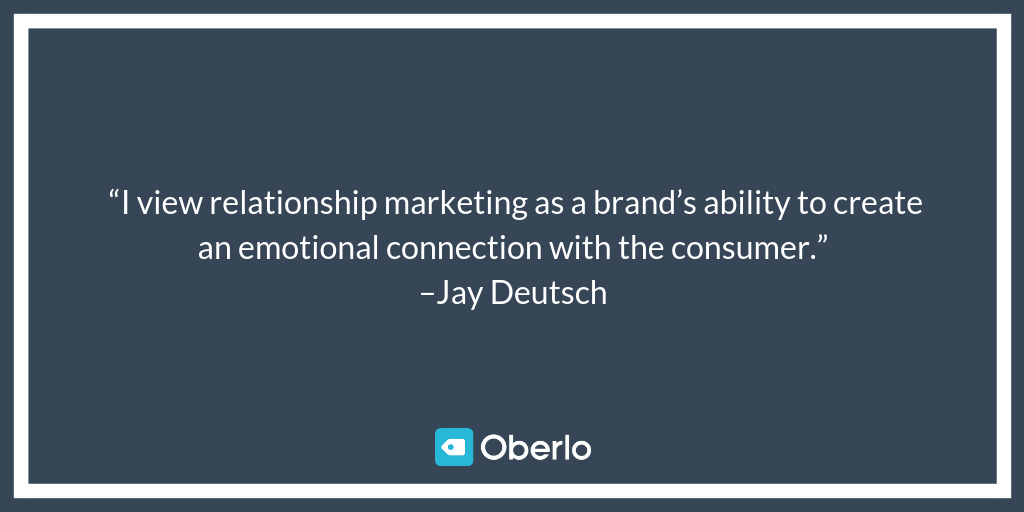
This means it’s all about the long-term.
And as a result, customer relationship marketing is very different from more traditional transactional marketing methods.
Take pay-per-click advertising.
PPC channels like Facebook advertising are all about money-in versus money-out. The predominant question is, “Are you making a measurable return on investment now?”
It’s short-term. It’s tactical as opposed to strategic.
On the other hand, relationship marketing is focused on building things like reputation, loyalty, and customer retention.
Patience is the name of the game.
This is because the time and money you put into relationship marketing may not produce a return for a while.
What’s more, it’s extremely difficult to measure the effect of your relationship marketing campaigns – there’s no reliable metric for emotions like goodwill and respect.
So why bother investing time and energy into relationship marketing?
Why is Relationship Marketing Important?
Relationship marketing is the difference between making $100 today or $1,000,000 in 5 years’ time.
It’s a multiplier.
The investments you make today can compound to produce incredible results in the future. Here’s how:
1. Strong Customer Relationships Lead to Higher Retention
Don’t underestimate the power of customer retention.
Why?
To start, global management consultancy Bain & Company found that increasing customer retention by just five percent can increase company profits by a whopping 25 percent.
Plus, repeat customers spend an average of 67 percent more than new customers.
But that’s not all.
Acquiring new customers is estimated to be 5 to 25 times more expensive than retaining current ones.
You can measure the power of customer retention using a key performance indicator called “customer lifetime value (CLV).”
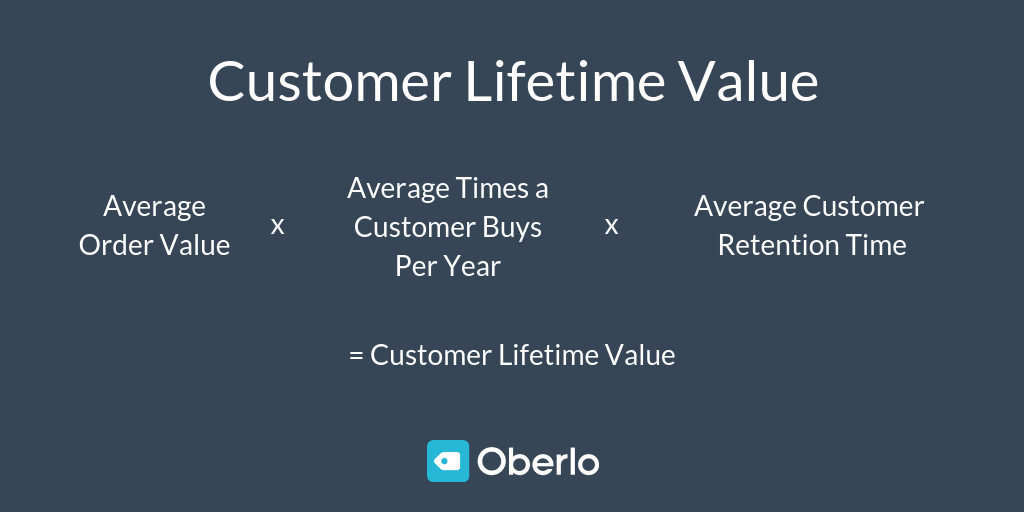
Okay, sure – the longer you retain customers, the more money you make and the higher your customer lifetime value.
But, that’s not even the best part.
This is: A high rate of customer retention is a superpower – one that you can use to dominate your competition.
Here’s how:
Say that your average customer lifetime value is $50, and your competitor’s is $25. This means that you’ll make $25 more than your competitor on each customer you land.
Now, imagine you’re running a PPC Facebook ad campaign.
These campaigns work on a bidding system. This means that the business which bids the most wins the opportunity to place their ad in front of their target audience.
And here’s the kicker:
When you make $25 more than your competitors on each customer, you can afford to bid a lot more on your Facebook advertising campaign than your competitor.
In other words, you can literally buy all of their traffic.
#Winner

2. Great Relationship Marketing Enhances Your Brand Reputation
What is a brand?
Amazon founder Jeff Bezos said it best: “Your brand is what other people say about you when you’re not in the room.”
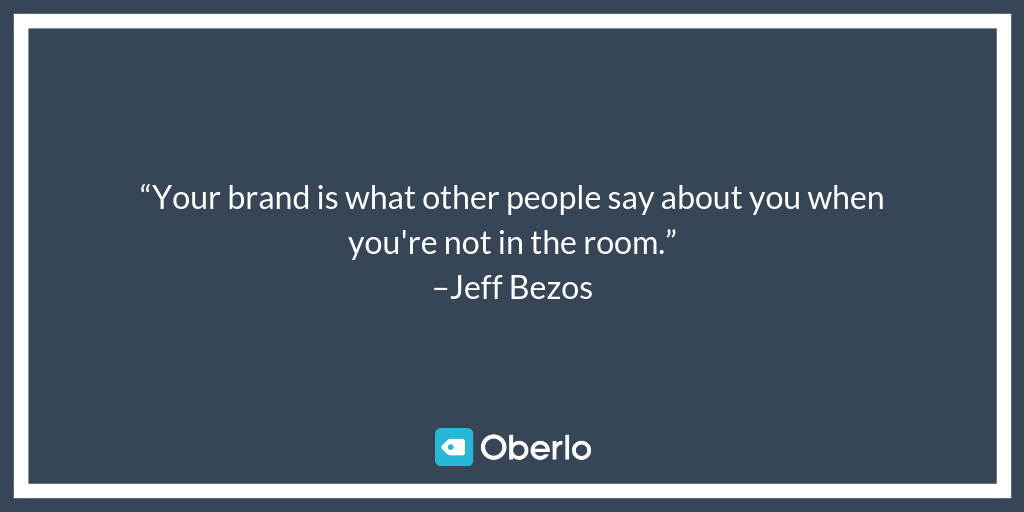
The state of your customer relationships determines your brand’s reputation. And a business won’t survive for long with a poor brand reputation.
I mean, how often do you buy things from people or businesses you don’t like?
As marketer George Farris said, “We elect and buy from people we like. Likability is number one. We also need to believe they are honest and have our best interests at heart.”
So you should pay attention to the way people perceive your business’s brand.
The success of online shoe store Zappos clearly demonstrates the power of reputation and strong customer relationships.
Tony Hsieh, the founder and CEO of Zappos, explained the business’ success by saying, “We’re now at over $2 billion dollars in gross merchandise sales, and the number one driver of all that growth has been repeat customers and word of mouth.”
3. Relationship Marketing Will Improve ROI Across the Board
Most businesses have such poor customer relationship marketing that they must work extremely hard to convince customers to purchase their products.
Truly great businesses don’t need to work at all.
For example, Apple simply announces a new product launch and the queues begin to form. No lengthy persuasion necessary.
That’s the power of relationship marketing.
However, you can’t achieve this with logical arguments or rationale. You must connect emotionally.
In the words of poet and activist Maya Angelou, “I’ve learned that people will forget what you said, people will forget what you did, but people will never forget how you made them feel.”
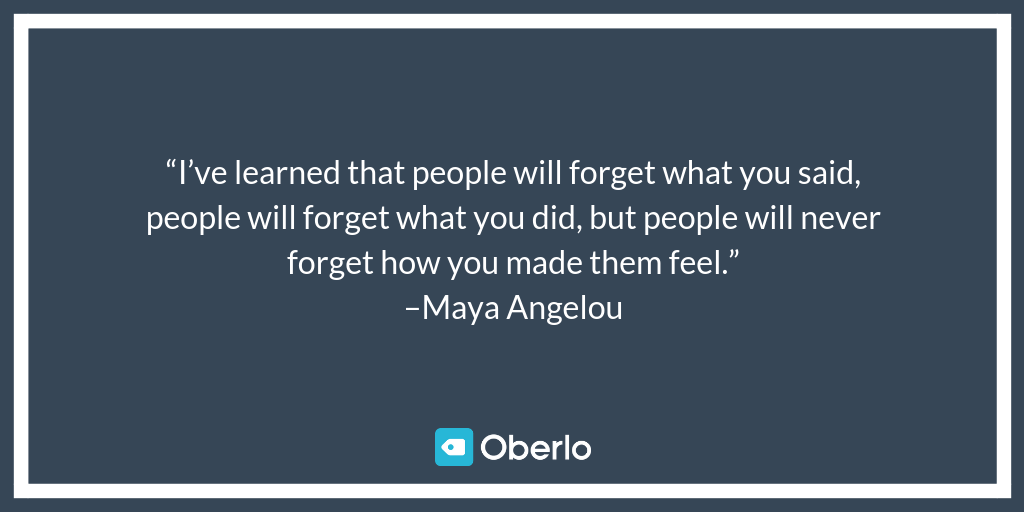
As Farris puts it: “Conversation with customers will increase sales, even if the product or service is never mentioned.”
Powerful relationship marketing builds a strong foundation and sets the stage.
It’s the oil in the engine: With it, everything is smooth and efficient. Without it, you’re toast.
10 Ways to Implement Powerful Customer Relationship Marketing
Now that you know what customer relationship marketing is and the ways in which it will help to propel you to success, let’s look at how to actually do it.
First things first:
1. Understand Your Core Values, Vision, and Mission
Your values, vision, and mission are the foundation of your brand – and as such, the bedrock of your relationship marketing efforts.
Crafting a message that resonates with your target audience begins with clearly understanding this foundation.
If you don’t know what you stand for and the impact you want to create, how will others?
This is why it’s important to create powerful mission and vision statements. Effective vision and mission statements unify an organization. It’s like planting a flag that your target audience can rally around.
If you don’t plant a flag, people can’t rally.
Once you know your core values, vision, and mission, you can begin to identify and attract other people with the same worldview and goals.
2. Know Who You’re Targeting
As dumb as it sounds, you can’t ask someone to prom until you know who you’re going to invite.
The same is true of relationship marketing.
Relationships are built on understanding and genuine interaction. So it’s essential to have a clearly defined target audience so you know how to tailor your messaging and interactions.
The more specific you can get, the better.
Elizabeth Gardner, the founder of Garnish Media, said it best: “It’s hard to target a message to a generic 35-year-old middle-class working mother of two. It’s much easier to target a message to Jennifer, who has two children under four, works as a paralegal and is always looking for quick but healthy dinners, and ways to spend more time with her kids and less time on housework.”
Luxy Hair knows exactly who they’re targeting: Women in their twenties with a strong interest in makeup, hair, and fashion.
As a result, all of their relationship marketing features images and videos of women within their target audience.

3. Work to Resonate and Connect
Once you know who you’re targeting, you need to find a way to resonate and connect with them.
Every video, ad, social media post, and email should make your target audience think, “Wow, they totally get me!”
As Ann Handley, Head of Content at MarketingProfs said, “Even when you are marketing to your entire audience or customer base, you are still simply speaking to a single human at any given time.”
Deathwish Coffee does a great job of this.
Check out the product page below where they use direct, bold language designed to resonate with their target market: “100% No B-S Guarantee.”
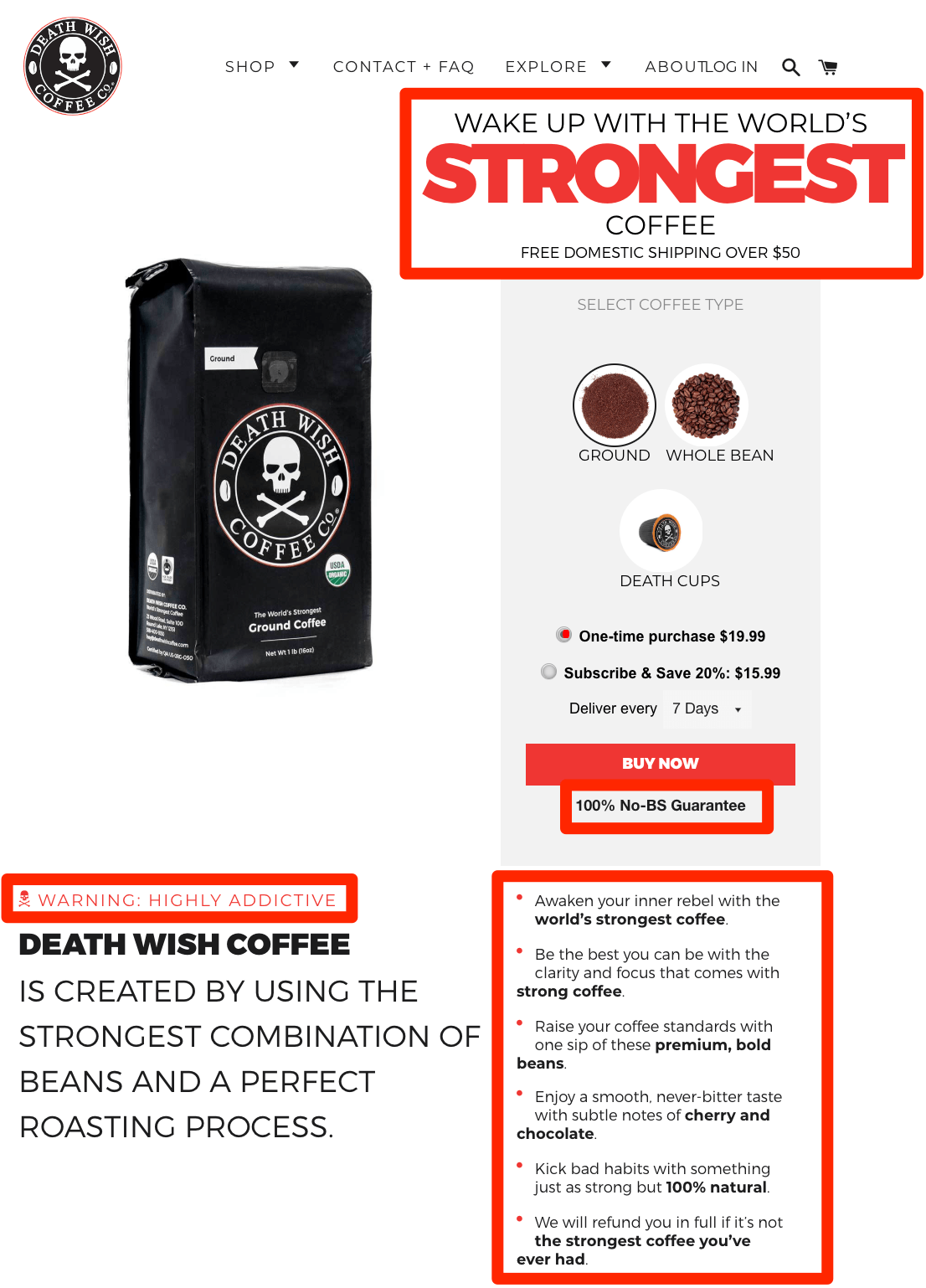
4. Wherever Your Target Audience Is, Be There
Great relationships take time to develop and deepen.
So be everywhere in your target audience’s lives. You want to pop up in their email inbox, their social media feeds, and alongside their favorite influencers.
To be clear, you don’t want to spam them. You just want to have a presence wherever they spend the most time.
If you’ve clearly defined your target audience, this is easier than you might think.
To get started, partner with influencers in your niche.
Gymshark does this to great effect with their Gymshark Ambassadors program.

These fitness influencers represent the Gymshark brand to their large social media followings and within the fitness community.

This serves to keep Gymshark at the forefront of their target audience’s thoughts.
5. Harness The Power of Word of Mouth
People talk. And thanks to the internet, word travels fast.
“It used to be that if you made a customer happy, they would tell five friends,” Bezos said in an interview on Forbes. “Now, with the megaphone of the internet, whether online customer reviews or social media, they can tell 5,000 friends.”
What’s more, word of mouth is powerful.
In fact, it’s such an influential form of communication that, 84 percent of consumers say that the recommendation of a friend or family member is their most trusted source when making a purchase decision.
This is why referral programs and affiliate marketing are such powerful forms of relationship marketing.
As author and marketing professor Jonah Berger said, “Advertising brings in customers, but word of mouth brings in the best customers.”
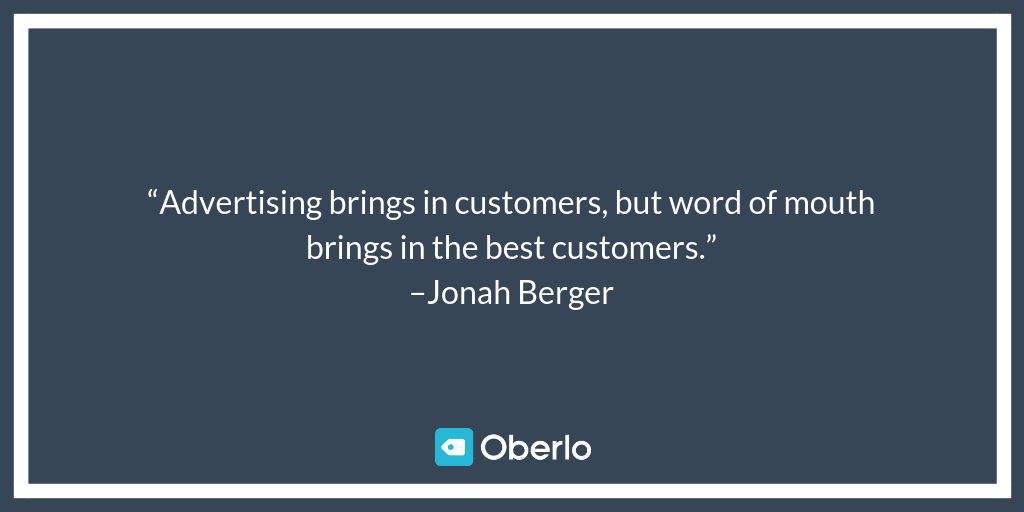
6. Give More Than You Take
Great businesses know that success comes from serving others. Whether it’s your product or service, the more you serve, the more you earn.
Think about it: Everyone knows someone who only ever talks about themselves – and no one likes to talk to them.
The same is true of your business communications.
To put it another way: It ain’t about you, it’s about them. And more specifically, it’s about finding ways to create value for your target audience.
Marketer and author Seth Godin said, “Our job is to connect to people, to interact with them in a way that leaves them better than we found them, more able to get where they’d like to go.”
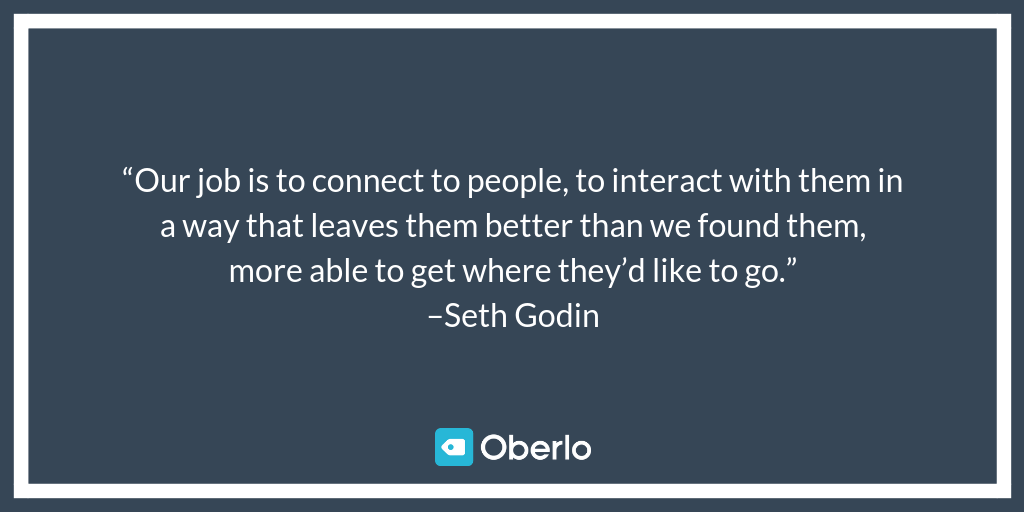
So make sure all of your relationship marketing benefits those you’re communicating with.
Matt Goulart, the founder of marketing agency Ignite Digital, explains: “Social media is about the people. Not about your business. Provide for the people and the people will provide for you.”
7. Use Content to Deepen Customer Relationships
Producing great content is an essential part of relationship marketing, as it’s an opportunity to create real value for your target audience without any expectation of an immediate return.
Travel gear brand Minaal creates inspirational content, as well as practical articles on:
- Packing a Suit in a Carry-On
- Keeping Your Passport Safe
- Eating Healthy While Travelling

This content is extremely helpful to Minaal’s target market of travelers. And in helping their target market, they build trust and an ongoing rapport.
The key to great content is understanding that it’s not about you – it’s about your target audience.
So remember what David Beebe, the founder and CEO of Storified Hospitality Group, said: “Content marketing is like a first date. If you only talk about yourself, there won’t be a second one.”
8. Ensure Your Relationship Marketing Efforts are Consistent
Relationships must be constantly maintained, otherwise, they will quickly wither and die.
Thanks to digital tools like social media and email marketing, maintaining customer relationships is much easier than it was in the past.
Make sure to create a content marketing plan and schedule social media posts in advance to ensure consistency.
Beardbrand has taken things a step further.
To ensure they’re effectively deepening customer relationships, they set up a special community for their community dubbed “The Alliance.”
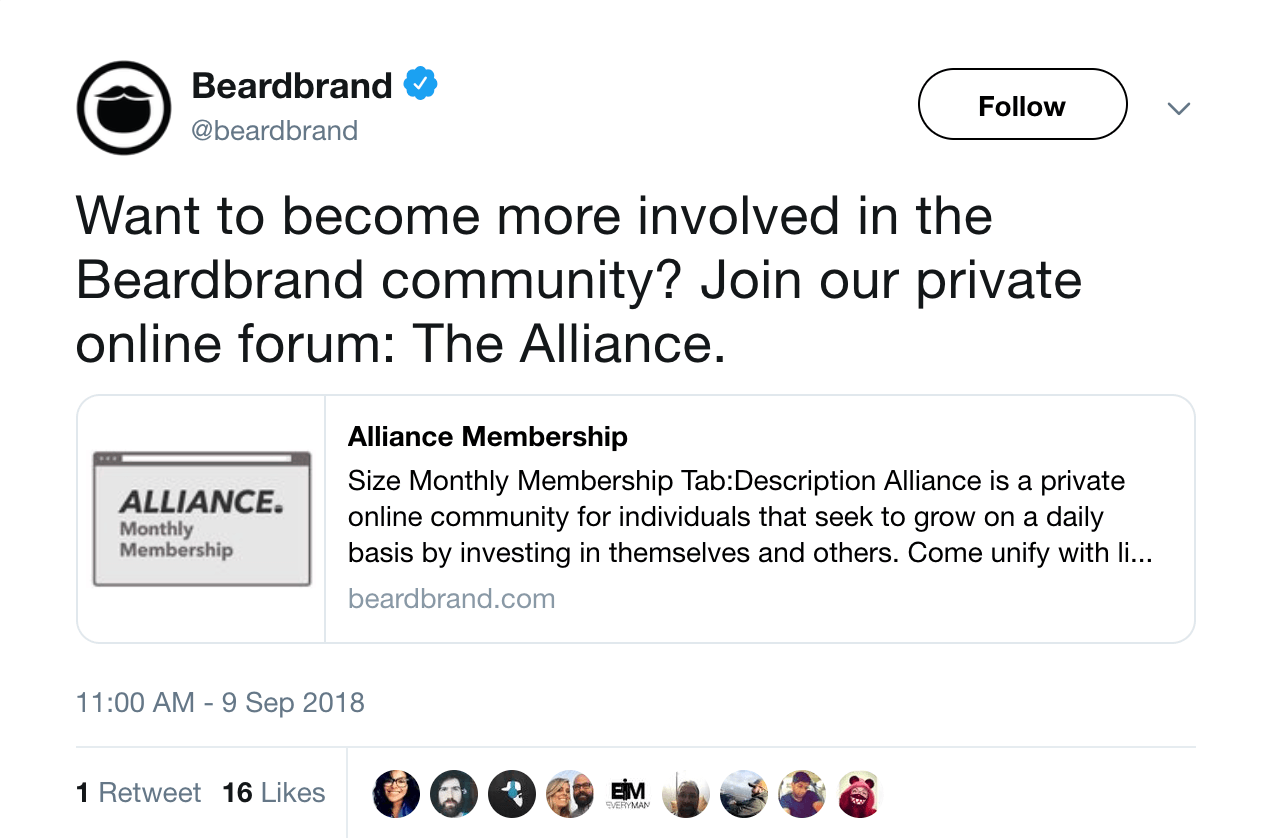
9. Don’t Just Talk, Listen
Relationships are a two-way street.
So relationship marketing must take into account as much listening as speaking.
Resist the urge to just broadcast to your customers without any thought of engaging them directly.
Business growth expert Meridith Elliott-Powell said, “To emotionally connect with customers we must listen. Listening sends a strong message that tells customers that this relationship will be more about their needs than ours. That builds trust.”
Kylie Cosmetics retweets and replies to tons of customer tweets on Twitter. This has contributed to the development of a community of incredibly devoted customers.
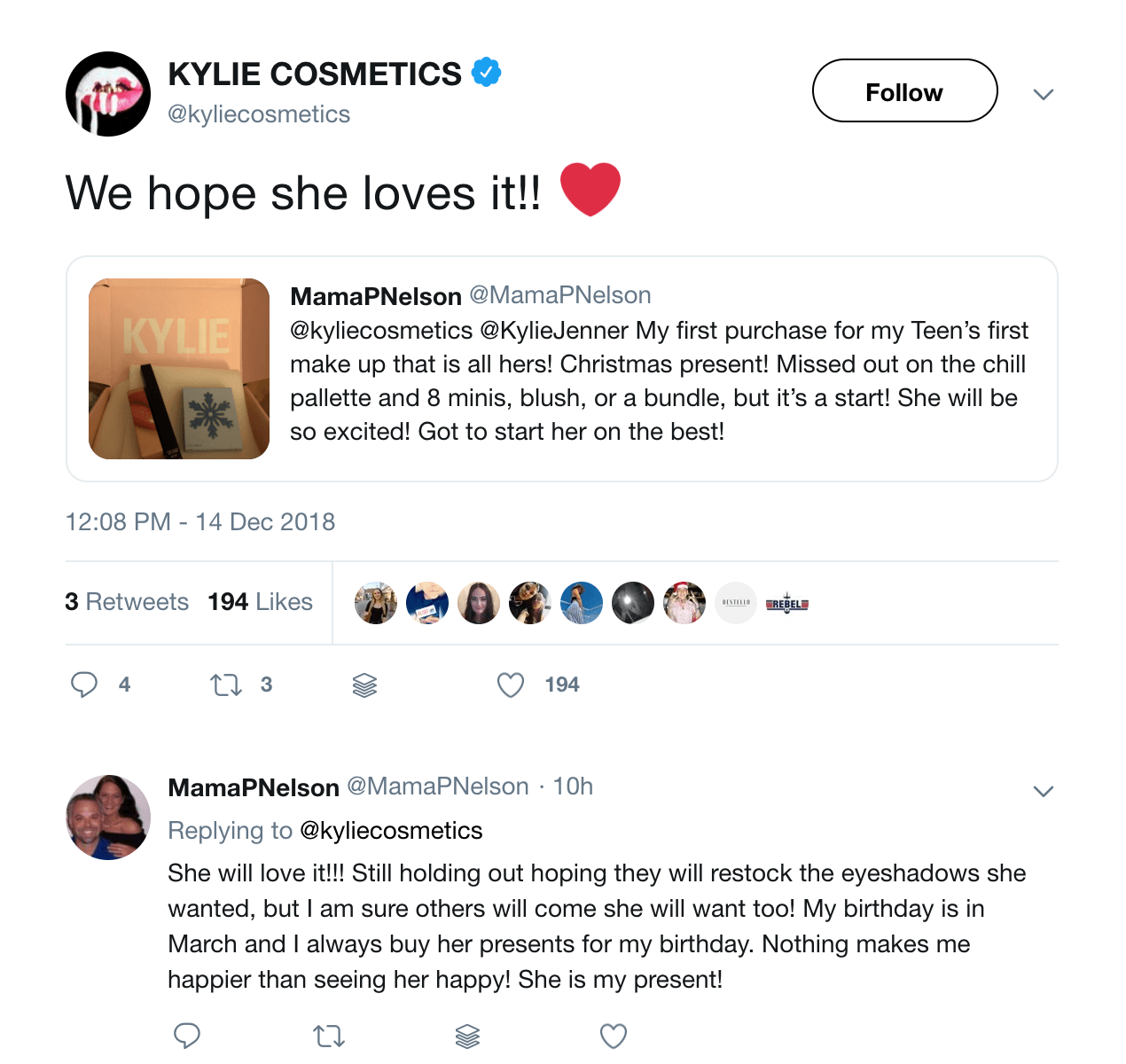
Plus, feedback is gold.
Listening to feedback from your customers presents a powerful opportunity to understand those aspects of your business which are worth investing in, and those that are a waste of valuable resources.
“Almost 90 percent of social media messages are unanswered by brands who send four times as many posts as replies,” said executive coach Lianne Lyne. “Build an emotional connection to your customers and create compelling stories by developing a social customer satisfaction strategy. Establish what resources you’ll need to ensure consistency, listen carefully to what your customers are saying, and respond authentically in a timely manner.”
10. Use Technology to Personalize Customer Interactions
How would you feel if you opened an email and the first line read, “Dear Customer 602341…”?
It’s fair to say everyone dislikes this sort of treatment.
Relationship marketing relies on personal connection. To do it well, you must personalize all of your communications.
This is easy to do when selling in person or over the phone, but what about when you’re marketing to thousands of people online?
Use technology.
Leading authority in buyer personas Tony Zambito said, “Instead of using technology to automate processes, think about using technology to enhance human interaction.”
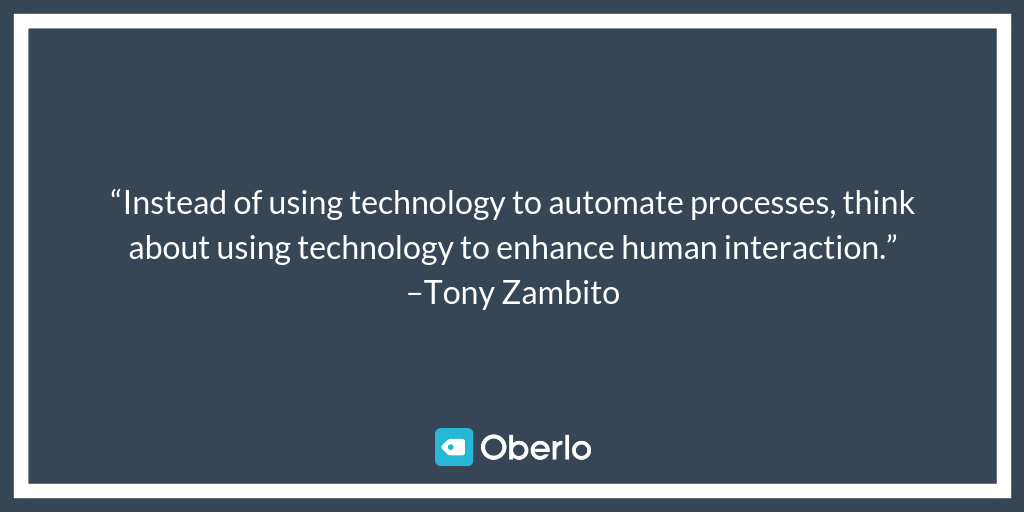
Personalization tools such as email list segmentation can go a long way to helping you create meaningful interactions that make people feel special.
Summary
Relationship marketing is all about nurturing customer relationships to encourage people to feel emotionally invested in your brand.
Remember, relationship marketing isn’t transactional. It takes time to develop strong relationships with your customers.
However, it’s worth the effort.
If you get it right, it can bolster all of your other marketing and sales efforts, and generate a base of devoted customers.
When approaching relationship marketing, make sure to:
- Have a clear understanding of your core values, vision, and mission
- Deeply understand your target audience
- Tailor all of your messaging so that it resonates with your target audience
- Use strategies like influencer marketing to maintain a constant presence wherever your target market spends time Encourage happy customers to spread the word about your brand through referral and affiliate campaigns
- Always work to give more than you take in every customer interaction
- Use content marketing to provide value to your target audience
- Maintain consistent communication with your target market using strategies like email marketing and social media
- Listen to your target audience and collect feedback which you can then use to improve your relationship marketing efforts
- Personalize your relationship marketing using tactics such as email list segmentation
Are you using relationship marketing to grow your business? How do you interact with your target audience? Let us know in the comments below!





